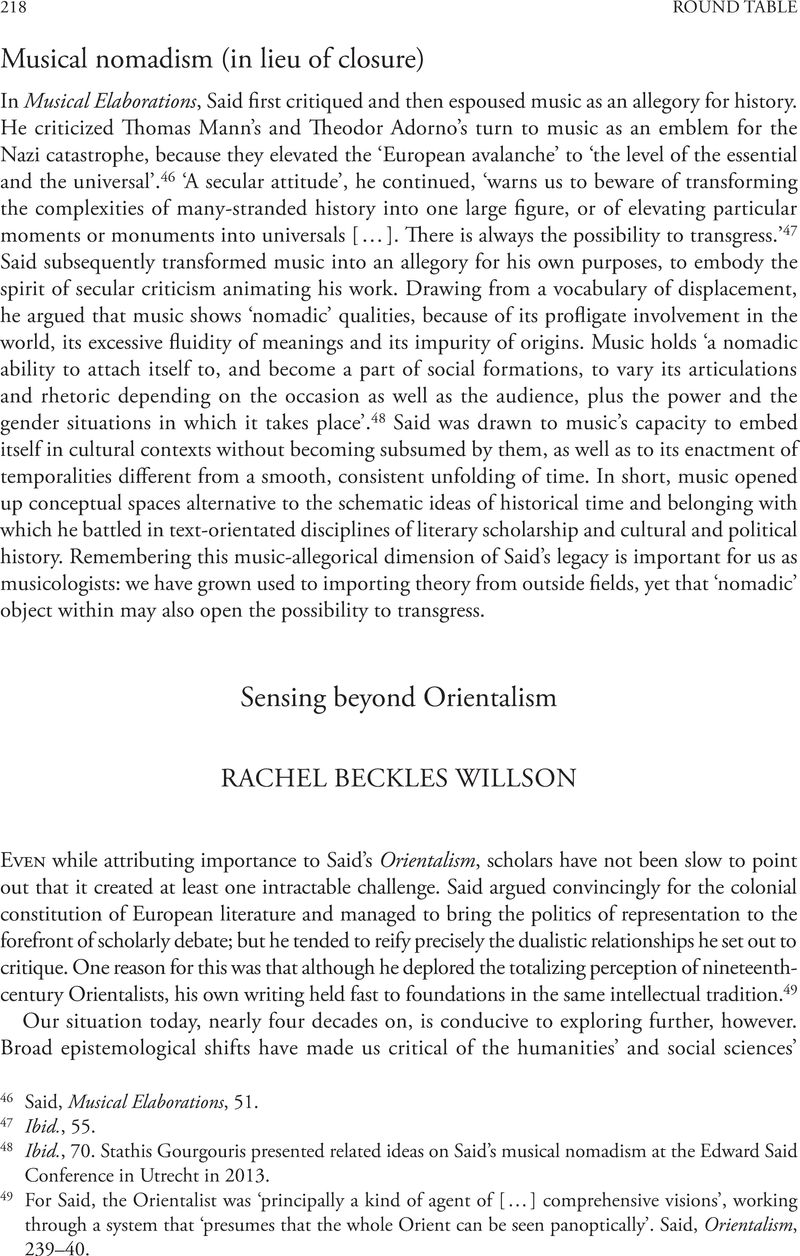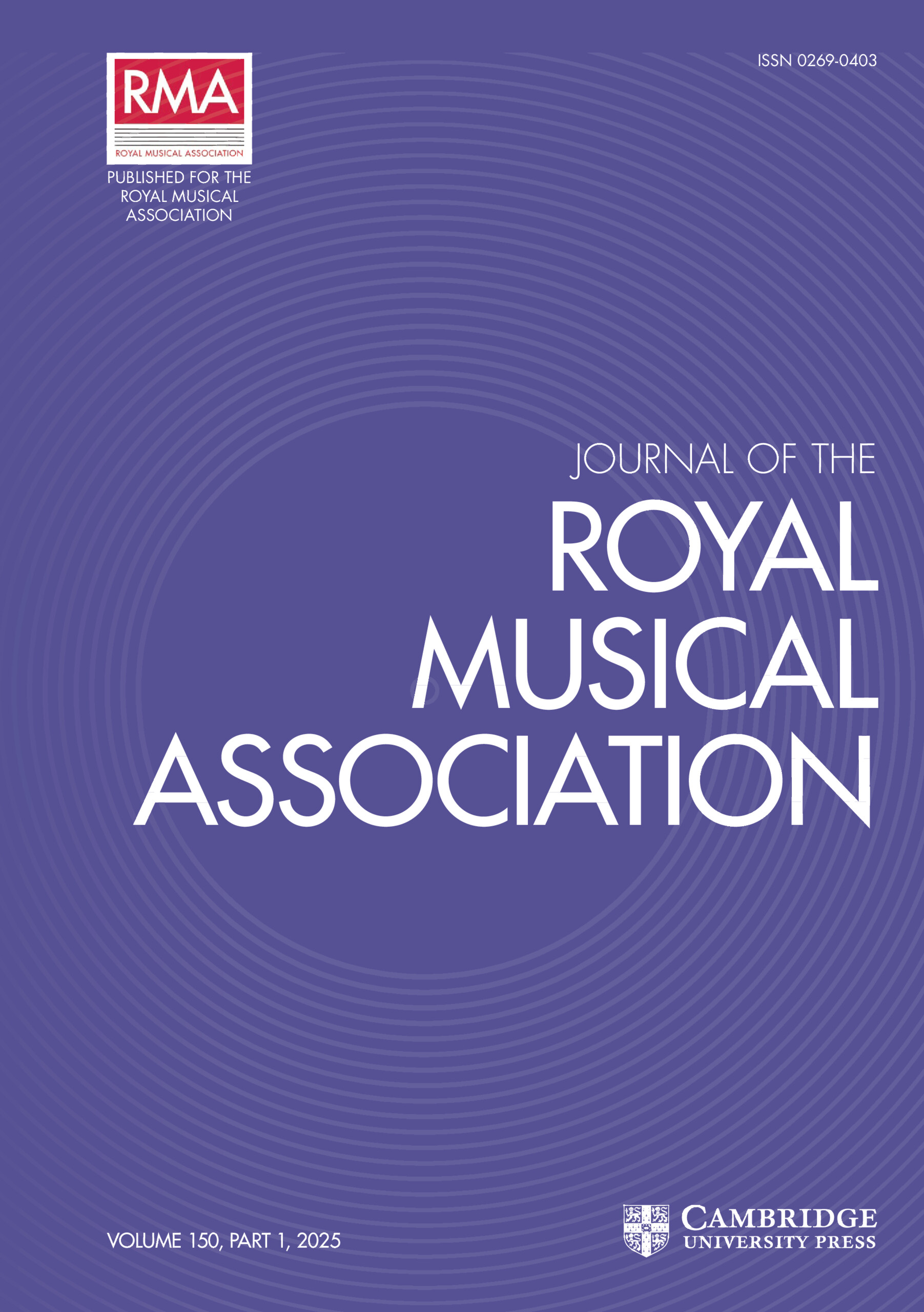No CrossRef data available.
Article contents
Sensing beyond Orientalism
Published online by Cambridge University Press: 01 January 2020
Abstract

- Type
- Round Table: Edward Said and Musicology Today
- Information
- Copyright
- Copyright © 2016 The Royal Musical Association
References
49 For Said, the Orientalist was ‘principally a kind of agent of […] comprehensive visions’, working through a system that ‘presumes that the whole Orient can be seen panoptically’. Said, Orientalism, 239–40.
50 Gilles Deleuze and Félix Guattari, Anti-Oedipus: Capitalism and Schizophrenia (Minneapolis, MN, 1972; repr. 1983); Johannes Fabian, Time and the Other: How Anthropology Makes its Object (New York, 1983); Jonathan Crary, Techniques of the Observer (Cambridge, MA, 1991); Constance Classen, Worlds of Sense: Exploring the Senses in History and Across Cultures (London, 1993). For an overview of such work, see Empire of the Senses: The Sensual Culture Reader, ed. David Howes (Oxford, 2004).
51 Steven Feld, Sound and Sentiment: Birds, Weeping, Poetics and Song in Kaluli Expression (Philadelphia, PA, 1982); Paul Stoller, The Taste of Ethnographic Things: The Senses in Anthropology (Philadelphia, PA, 1989). Numerous works situate sound in broader discussions: see, for instance, Michel Serres, The Five Senses: A Philosophy of Mingled Bodies, trans. Margaret Sankey and Peter Cowley (London, 1985; repr. 2008); Don Ihde, Technology and the Lifeworld: From Garden to Earth (Bloomington, IN, 1990); and Brian Massumi, Parables of the Virtual: Movement, Affect, Sensation (Durham, NC, 2002).
52 Edward Said: The Last Interview (DVD, Extended Version, dir. Mike Dibb, prod. D. D. Guttenplan; ICA Projects, 2004), at 20:27.
53 Edward Said: The Last Interview, at 21:21.
54 Ibid., at 22:03.
55 Judith Butler, Excitable Speech: Towards a Politics of the Performative (London, 1997).
56 See above, note 33.
57 Said, Out of Place, 27–8.
58 The Latin root of ‘evidence’ is ‘videre’, to see. Yannis Hamilakis, Archaeology and the Senses: Human Experience, Memory, and Affect (Cambridge, 2013), 5–6.
59 Said does not mention it, but recordings of Umm Kulthum's concerts allow us to hear the active and noisy audience participation that was typical of the time. Calling out in appreciation is part of Arab music traditions, and could have contributed to Said's feelings of discomfort, because he was not himself able to take part. For discussion of historical and contemporary aspects of this ‘creative listening’, see Ali Jihad Racy, Making Music in the Arab World: The Culture and Artistry of Tarab (Cambridge, 2004), 131–3.
60 I would not myself use the term ‘network’ for Said's situation here, because of its association with Actor Network Theory. To me, an approach with more sensitivity to living organisms, and a focus on flows rather than actors/objects, seems more appropriate. Useful theorizations include Tim Ingold's ‘Towards an Ecology of Materials’, Annual Review of Anthropology, 41 (2012), 427–42, which draws together his thinking on the distinction as developed over some years, and the positing of a ‘sensorial assemblage’ in Hamilakis, Archaeology and the Senses, 126ff.
61 For one influential theorization of this educational process in the explicitly sensorial realm, see Teresa Brennan, The Transmission of Affect (Ithaca, NY, and London, 2004), 116ff.
62 Hala Sakakini, Jerusalem and I: A Personal Record (Amman, 1990), 7–9, 13–16, 18, 37, 68, 72–3. Hala was a daughter of Khalil Sakakini (1878–1953), essayist, poet, scholar and founder of three schools (1909, 1925 and 1938), who also served as Education Inspector under the Ottoman and the British regimes in Palestine. I present Hala's memoirs in a broader context in Orientalism and Musical Mission, 116–212.
63 Sakakini, Jerusalem and I, 80.
64 Ibid., 78.
65 Gregory J. Seigworth and Melissa Gregg, ‘An Inventory of Shimmers’, The Affect Theory Reader, ed. Gregg and Seigworth (Durham, NC, 2010), 1–25 (p. 1).
66 In an expanded version of this paper I address Said's sensing in the piano recital as well, and suggest it affords us insights into a broader range of musical experience as well as a return to the political. See Rachel Beckles Willson, ‘Value and Abjection: Listening to Music with Edward W. Said’, Against Value in the Arts and Education, ed. Emile Bojesen, Sam Ladkin and Robert McKay (forthcoming).


